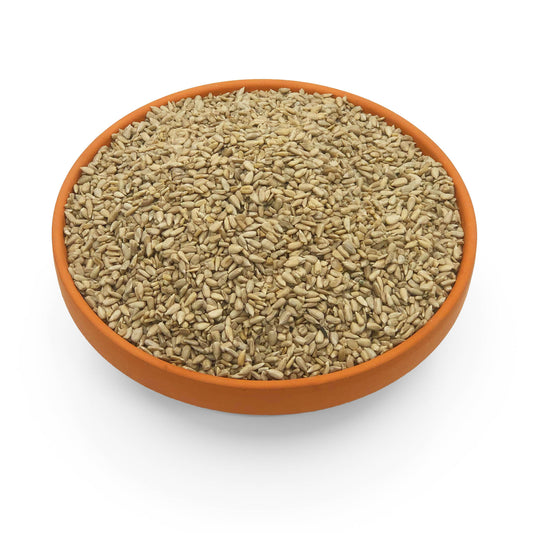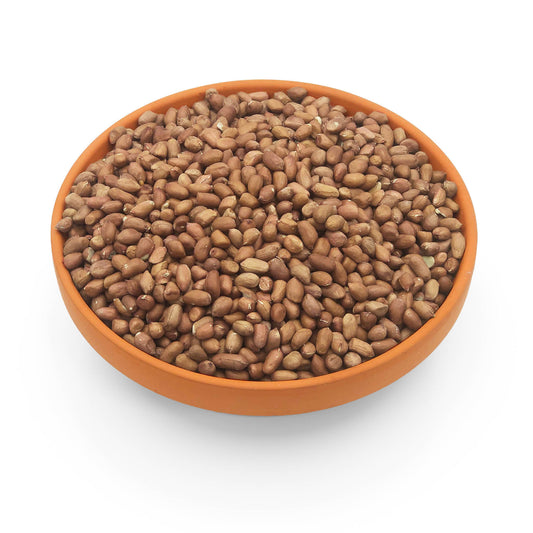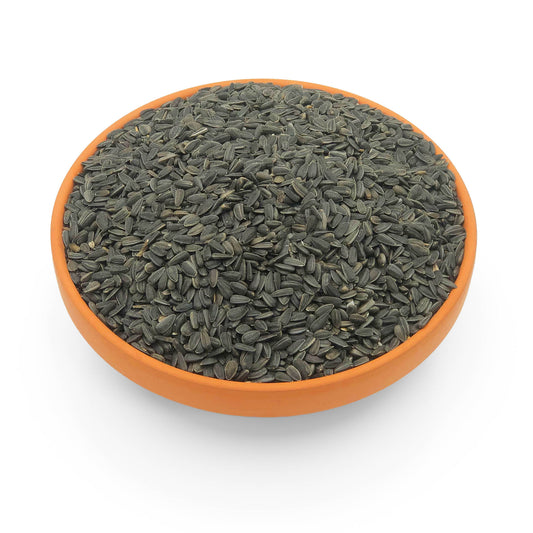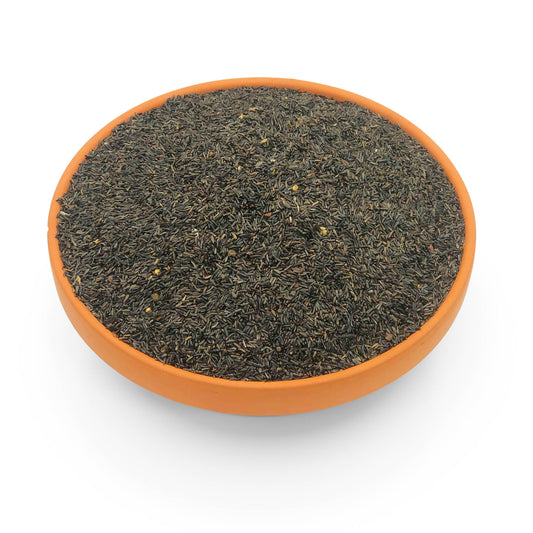Collection: Straight Seeds
Swainstons Seed Straights
Our collection of straight bird seeds, sourced from the finest locations across the UK and around the world, offers nature's finest treasures, including black sunflower seeds, sunflower hearts, peanuts, and wheat, allowing you to select your favourites or create a bespoke wild bird food mix to attract a delightful variety of garden birds
-
Sunflower Hearts Bakery Grade A
Regular price £25.00 GBPRegular priceUnit price / per -
Whole Peanuts Premium
Regular price £28.00 GBPRegular priceUnit price / per -
Black Sunflower Seeds
Regular price From £19.50 GBPRegular priceUnit price / per -
Nyjer Seed 12.75KG
Regular price £27.50 GBPRegular priceUnit price / per
FAQS
What Type Of Bird Food Should I Use
Gifting nature's treasures to our winged companions goes beyond beauty – it's a gesture that harmonises with the rhythms of the wild. In the realm of garden bird cuisine, five main types of sustenance unfold:
- Straight Seeds: Think sunflower hearts – a gourmet delight for discerning beaks.
- Seed Mixes: A symphony of variety – blends of diverse seeds with possible additions like suet pellets and chopped peanuts.
- Peanuts: Whole or sliced, peanuts offer energy-packed morsels for spirited visitors.
- Suet Creations: Fat balls, suet pellets, and suet blocks form a feast of energy-rich goodness.
- Live Temptations: Enter mealworms, a live food that ignites excitement in the avian world.
Diversity weaves the magic – a platter of options entices an array of birds. Yet, here's the secret: it's not just about what you offer, but how you present it. The art of bird feeding is a dance between food and feeder. Choose wisely, for each bird species possesses a unique feeding style.
As you scatter the banquet, anticipate a delightful array of visitors. From nimble finches to elegant thrushes, your garden transforms into a haven of nourishment and camaraderie.
So, embrace the symphony of flavours, the dance of feeders, and the enchantment of avian company. Let your garden echo with the melodies of feathered friends – a tribute to nature's harmony. 🕊️🌿
Foods to Skip in Your Feeding Routine
When extending a generous hand to our avian companions, knowing what to avoid is as crucial as knowing what to offer. Steering clear of certain foods ensures the health and well-being of our winged friends:
- Salty Pitfalls: Beware of foods laden with salt. High-salt content can be detrimental to a bird's health and disrupt its delicate balance.
- Cooked Meat Fat and Oils: While our culinary indulgences are tempting, it's best to keep away cooked meat fat and oils. The remnants of roasts, chickens, or festive turkeys might seem like treats, but they can have dire consequences for birds, even leading to their demise.
- Liquid Fat Concerns: Fat, when it's in liquid form on food, isn't just about consumption. It can have a negative impact on a bird's plumage, hampering its ability to take flight.
- Bread Beware: Surprisingly, even bread – a staple in many households – isn't suitable for our feathered friends. It lacks the nutritional benefits birds need for their well-being.
As you create a sanctuary for these enchanting creatures, remember that your offerings contribute to their vitality and survival.
By avoiding these harmful foods, you ensure a safe and nurturing environment, where the beauty of nature thrives without compromise. Let's elevate our understanding and embrace the responsibility of safeguarding our avian guests. 🕊️🌿
When to Refresh Your Bird Feeder's
How frequently should we replenish the food in our bird feeders? The answer lies within the subtleties of nature's cues:
Timing Matters: Generally, there's no need to fuss over the feeder's food unless it shows signs of age, deterioration, or mould. If you find the food untouched, it's an indicator that birds have their reasons for steering clear.
Quality Assurance: The primary culprit behind uneaten food is its quality. Opt for superior-quality offerings that resonate with birds' tastes and nutritional needs. When you choose high-caliber fare, you're more likely to witness birds delighting in every morsel.
Location, Location, Location: Sometimes, it's not about the food; it's about the setting. Birds can be particular about their dining surroundings. If your feeder is placed too close to a bustling thoroughfare, it might give our avian friends pause. Opt for a serene spot that invites birds without distractions.
Mould and Deterioration: Old, deteriorated food or anything showing signs of mould should be promptly removed. Mould can harm both birds and their dining experience, so keeping a watchful eye is essential.
In the delicate balance of bird feeding, the secret lies in your understanding of their needs. Listen to nature's whispers – untouched food speaks volumes about preferences and conditions.
Enhance the experience by curating a nourishing feast and providing a peaceful setting. As you care for their well-being, your garden transforms into a haven of avian camaraderie and connection. 🕊️🌿
Why Do Birds Throw Seeds From Feeder
As we delve into the world of our feathered neighbours, a curious behaviour often catches our attention – the seemingly puzzling act of birds discarding seed from feeders. Unraveling this avian enigma, we find three key reasons behind this intriguing behaviour:
- Quality Matters: Imagine a world of flavours laid out before you. Birds, too, have discerning palates. Poor-quality seed or seed mixes are swiftly dismissed by these connoisseurs of nature. Opting for high-quality seed and meticulously crafted mixes, such as those from Vine House Farm, ensures that your avian friends indulge in nothing but the finest.
- The Hunt for Perfection: Picture a treasure hunt where the prize is a specific gem amidst a trove. Some bird species are selective, favouring certain seeds within a mix. In their quest, they nimbly throw aside undesired seeds, aiming for the culinary delights they seek. Coal tits, for instance, epitomise this behavior, honing in on treasures like sunflower hearts.
- Seeking the Ideal: Birds, much like us, are drawn to perfection. Some evidence suggests that birds are on the hunt for the ideal-sized seed, even when it's of the same type. It's a dance of preference and precision. A Coal tit, for instance, may sift through black sunflower seeds, searching for the quintessential one.
As we observe this intricate ballet, let's marvel at the nuances that shape avian behaviour. Our feathered friends are not just eaters; they are connoisseurs, seekers of perfection, and embody a world where nature's intricacies unfold.
By understanding their motives, we enhance our connection to these enchanting creatures, a connection that echoes the exquisite symphony of the wild. 🕊️🌿
When to Feed Your Garden's Wild Birds
Nurturing Year-Round: When to Extend Your Garden's Avian Feast
As the seasons weave their magic, a question arises – when is the optimal time to grace our garden with nourishment for our feathered friends? Let's embark on a journey through the cycle of nature's rhythms:
Winter's Embrace: Among the pages of the year, winter claims a special significance. The reason is as clear as day – it's a time when Mother Nature's pantry is at its most bare. As temperatures drop, food availability dwindles, and our avian companions seek solace. Species like the Blackbird and Chaffinch, their numbers bolstered by migrating visitors from northern Europe, find respite in your offerings.
Year-Round Sustenance: Beyond winter's chill, the act of feeding remains vital. Modern landscapes bear witness to a decline in invertebrates, notably flying insects, which many songbirds depend upon. Pollution, changing farming methods, land use, and climate shifts have ushered in this dearth of natural food. Thus, your garden becomes a beacon of hope and sustenance throughout the year.
Urban Vs. Rural: Location weaves a tale of its own. Urban landscapes and intensive farming regions often grapple with limited natural food. In contrast, rural realms, boasting diverse habitats and lush native woodlands, offer more culinary choices to our feathered visitors.
As you embark on this nurturing journey, remember that each season unveils its own tapestry of needs. From winter's warmth to spring's awakening, from summer's song to autumn's whispers, your garden echoes with the rhythms of life. Extend your hand in every season, nourishing nature's choir with your offerings. In this dance between mankind and the wild, your garden becomes a stage for harmony and connection. 🕊️🌿
Seed Changing and Refilling Insights
Amid the tapestry of bird feeding, a common query emerges – how often should the ritual of changing and refilling bird seed take place? Delve into the rhythms of nature's banquet with these insights:
Seed Stability: Quality and placement form the pillars of your bird seed's longevity. Opt for premium seed, and position your feeder wisely – these elements encourage consumption rather than wastage.
Regular Topping: When it comes to refilling, consistency is key. Keep the feeder topped up, preventing it from emptying completely. Here's why: Firstly, attracting birds to your garden requires time, and a sudden void halts this gradual process. Secondly, an empty feeder resets the stage, necessitating birds to rediscover it anew.
Energy Conservation: As your feeder's contents dwindle, bird dynamics shift. Some ports become inaccessible, leading to avian squabbles over the remaining accessible ones. This rivalry drains their precious energy. A perpetually filled feeder avoids this scenario, fostering a harmonious feeding experience.
Nature's Partnership: In the garden of giving, synchrony between quality seed and consistent care blossoms. The art lies not only in the sustenance you provide but also in the seamless continuity.
With each filled port, you extend an invitation to a symphony of feathered guests, harmonising your space with the serenade of nature. 🕊️🌿
Purchase In Confidence
ABOUT US-
FREE SHIPPING
The convenience of our seamless service! With Swainstons, your orders are swiftly delivered to your doorstep within 48 hours, and the best part? It's absolutely free! Enjoy the ease of shopping from the comfort of your home while we ensure your bird seeds reach you in no time. 🚚
-
FRESHEST SEEDS
Family Run Mill for 40 years we know quality begins with freshness. We only use the freshest seeds for our blends, ensuring your feathered friends receive the finest nutrition. Enjoy your bird feeding experience with nature's choicest offerings. 🌱
-
RECYCLED PACKAGING
At Swainston's, our dedication to nature extends beyond bird seeds. We embrace eco-conscious practices by using recycled packaging for our products. Every delivery is a step towards a greener future, where nourishing your feathered companions goes hand in hand with caring for the environment. 🌍




